IM Motors Incorrectly Labeled Key Parameters of the Xiaomi SU7, Forcing an Apology in the Early Morning Hours with Three Consecutive Statements from Xiaomi.
After Liu Tao's post, the Xiaomi car spokesperson immediately retweeted the previous Weibo, stating that they do not accept "a lightly described, informal apology," and urged IM Motors to immediately make a public clarification.
It was supposed to be the official launch event for IM Motors, yet Xiaomi ended up trending again.
On April 8th, IM Motors officially unveiled the "super intelligent sedan" IM L6 and commenced pre-sales. As the first product to feature a solid-state battery in mass production, the IM L6 is expected to have a driving range that exceeds 1,000 kilometers, and IM Motors has high expectations for this model.
However, during the event, IM Motors repeatedly targeted Xiaomi by comparing the specifications of the L6 with the Xiaomi SU7. In one of the comparison charts, IM Motors claimed that the L6 uses dual carbon silicon electric drives and mentioned that the Xiaomi SU7 Max uses an electric drive system with a front IGBT and a rear carbon silicon module. This incorrect parameter sparked Xiaomi's serious dissatisfaction.
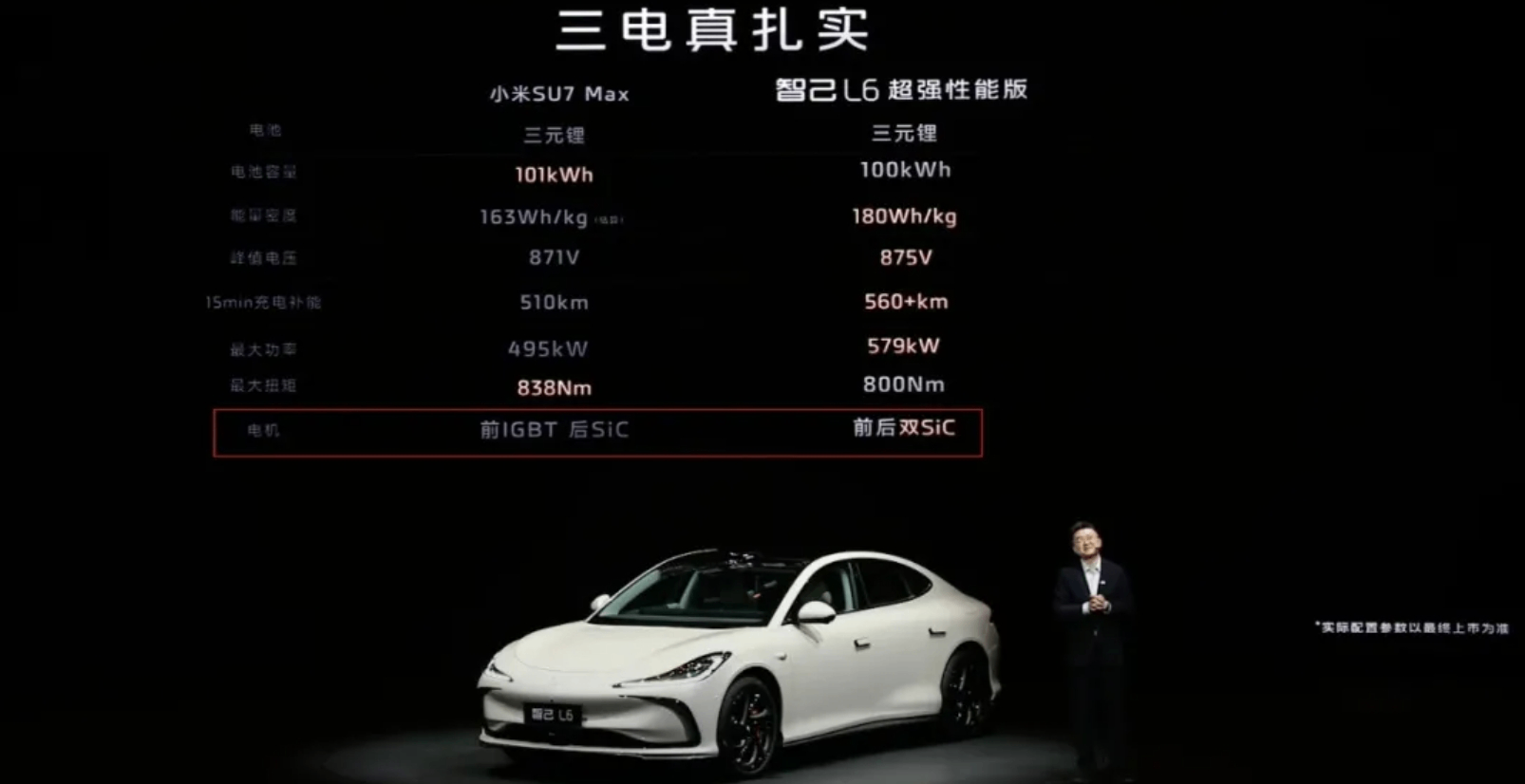
Xiaomi's product manager, Pan Xiaowen, first responded on Weibo, stating that the Xiaomi SU7 series uses silicon carbide (SiC) across the entire range. Subsequently, Xiaomi's official spokesperson posted three Weibo messages, urging IM Motors to immediately make a public clarification and apologize.
Xiaomi stated that as a subsidiary of SAIC Group, it is inconceivable for IM Motors to make such a mistake and not correct it even after being alerted by netizens, which does not match the reputation of SAIC Group.
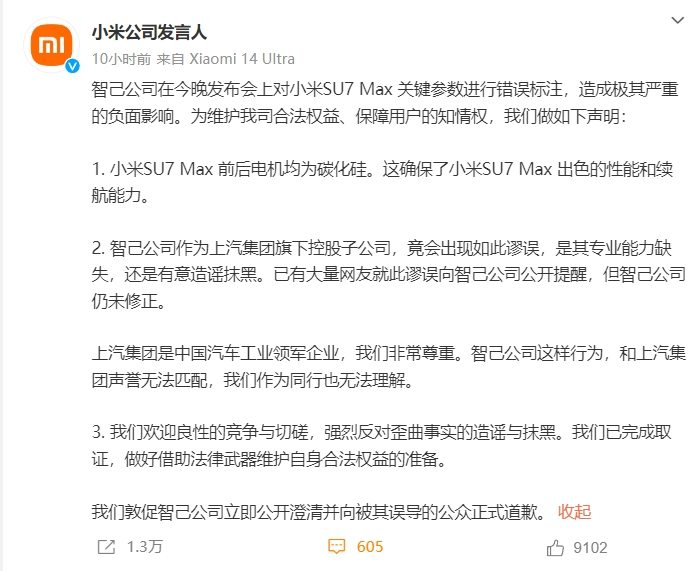
Under pressure from Xiaomi, at 23:04 last night, IM Motors' co-CEO Liu Tao publicly apologized on Weibo: "Due to an error in the research results of product information, there was a mistake in the information presented at the event. Like the IM L6, the Xiaomi SU7 also uses SiC carbon silicon modules for both front and rear motors. Xiaomi SU7 is indeed a competitor that we respect very much! Hereby, I sincerely apologize to Xiaomi Motors and everyone."

However, Xiaomi was clearly not satisfied with Liu Tao's personal apology. After Liu Tao's post, Xiaomi's spokesperson immediately retweeted the previous messages, stating that they do not accept "a lightly described informal apology" and urged IM Motors to immediately make a public clarification.
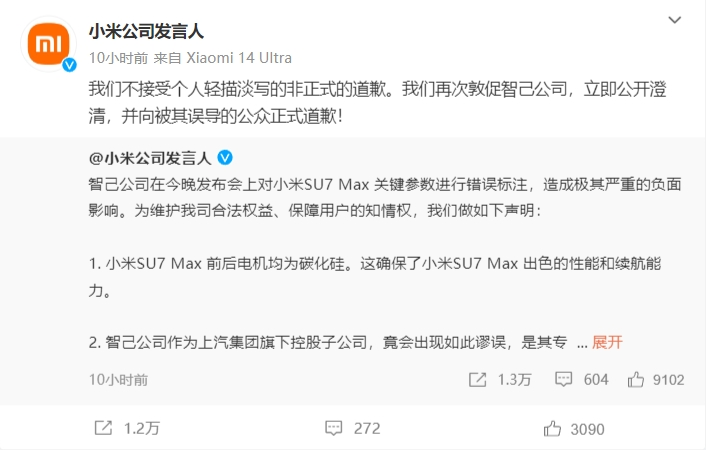
IM Motors did not respond further.
Until early this morning, Xiaomi's spokesperson issued a third Weibo message, giving an ultimatum to IM Motors: Our patience is limited regarding IM Motors' recent actions of harassment and defamation. We firmly believe that such unreasonable, illegal, and unseemly behavior by IM Motors does not match the corporate culture, values, and industry status of SAIC Group, nor does it align with the historical trend of unity in the development of China's new energy vehicles.
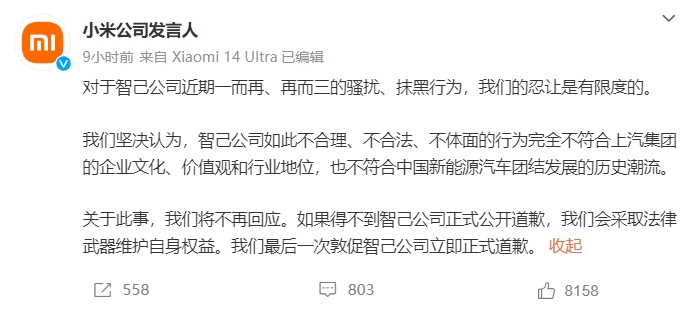
Xiaomi's spokesperson also stated firmly: We will no longer respond to this matter. If we do not receive a formal public apology from IM Motors, we will take legal action to protect our rights. This is our last call for IM Motors to immediately issue a formal apology.
This time, IM Motors finally compromised. Within 37 minutes after Xiaomi's ultimatum, IM Motors issued an official apology letter, clarifying the incorrect parameters of the Xiaomi SU7 during the event and apologizing to Xiaomi Motors:
Both the Xiaomi SU7 Max front and rear motors use SiC carbon silicon modules, which are consistent with the technology used by the IM L6 and are top industry standards. Xiaomi Motors and its product SU7 are respected competitors! We deeply apologize for the negative impact caused to Xiaomi Motors due to our internal review oversight and sincerely apologize to all fans and users!
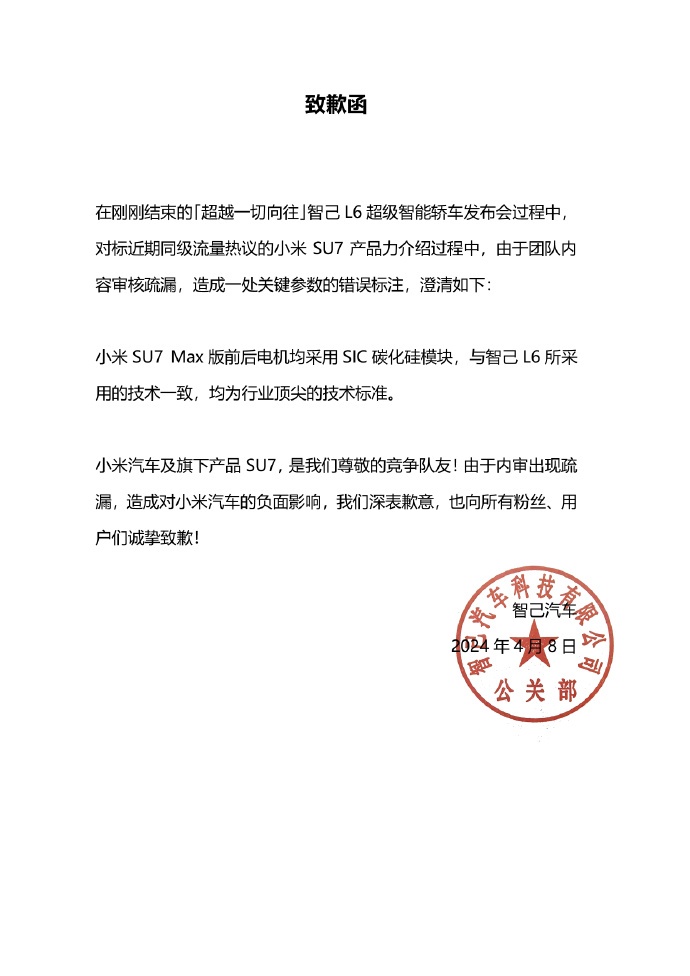
It is understood that compared to the traditional front IGBT and rear SiC modules, dual SiC electric drives have significant advantages. Firstly, the higher electron mobility and thermal conductivity of SiC can effectively reduce energy loss during power conversion. Additionally, since SiC can withstand higher working temperatures and voltages, vehicles equipped with dual SiC drives tend to perform more reliably and stably under extreme conditions. Most importantly, the higher power density and thermal properties of SiC materials can greatly enhance the overall performance and driving range of electric vehicles.
·Original
Disclaimer: The views in this article are from the original Creator and do not represent the views or position of Hawk Insight. The content of the article is for reference, communication and learning only, and does not constitute investment advice. If it involves copyright issues, please contact us for deletion.